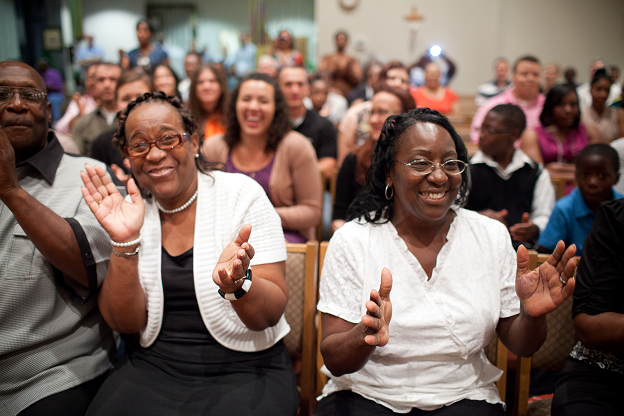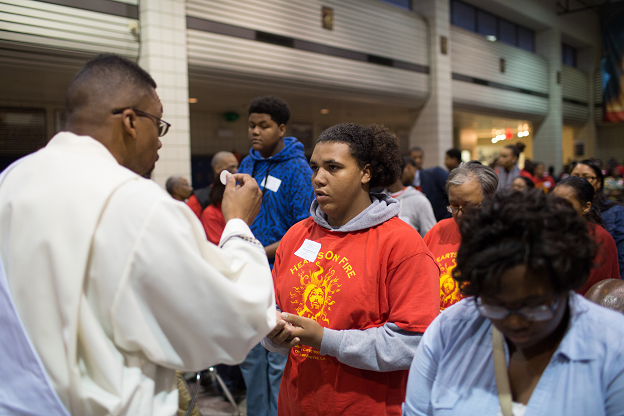Throughout the month of February, in recognition of Black History Month, people of all races and faiths across the U.S. celebrate black Americans and their stories. The story of black Catholics in the United States is about communities tenaciously clinging to faith amidst great hardship. Much of their history is centered in the South, which to this day has the largest concentrations of black people in the United States, and includes over two dozen of the dioceses served by Catholic Extension Society. Even among many black people that live in the urban areas of the North, though, there are many whose families have roots in the South. During the Great Migration, some 6 million black people traveled to northern cities like New York, Chicago, and Detroit, leaving rural jobs to find work in the new industrial centers.

There are many causes for celebrating the gifts of black Catholics today. One is simply the numbers that populate parishes across the country: the U.S. Conference of Catholic Bishops estimates that there are 3 million black Catholics in the U.S., and 798 predominantly African American parishes. While many black people are Baptist, the second largest religious group that black people belong to in the U.S. is the Catholic Church. There are 250 African American priests, 437 deacons, 75 men of African descent in seminary formation, 400 African American religious sisters, and 50 religious brothers. These numbers do not include missionaries from Africa who now serve in various ministries throughout the United States.
Another cause for celebration is the inspiring list of black men and women whose causes for canonization are being advanced. In 2018, the historically black Xavier University of Louisiana (founded by Saint Katharine Drexel) announced that its Institute of Black Catholic Studies (IBCS) would support efforts toward the canonization of five black Catholics:
- Venerable Pierre Toussaint (1766-1853), the former slave and philanthropist who is buried in New York’s Saint Patrick’s Cathedral;
- Venerable Henriette Delille (1813-1862), from New Orleans, a descendant of slaves who founded the Sisters of the Holy Family;
- Servant of God Mother Mary Elizabeth Lange (ca. 1794-1882), the Haitian refugee who had a passion for educating children and who founded the Oblate Sisters of Providence;
- Servant of God Father Augustus Tolton (1854-1897), who was born in slavery and eventually attended seminary in Rome because no American seminary would accept him, and who was a pastor in Chicago;
- Servant of God Julia Greeley (c. 1833-1918), the former slave who was Denver’s “Angel of Mercy,” now buried in Denver’s cathedral.
More recently, the Diocese of Jackson announced the beginning of formal efforts to advance the cause for canonization of Sister Thea Bowman, one of the founding members of the IBCS. There is reason for great hope that these figures will inspire generations of Catholics regardless of race.
Recent years have also seen the rise of black Catholic leadership in the Church. Joseph Howze, the founding bishop of the Diocese of Biloxi, died on January 9 at the age of 95. He was only the second black bishop to lead a diocese in the United States, after James Augustine Healy was named the ordinary of Portland, Maine, in 1875. Today, though, there are eight active, six retired, and twelve deceased black bishops. Many of them have roots in mission dioceses, such as those members of the Society of the Divine Word who were trained at the United States’ first black seminary, Saint Augustine in Bay St. Louis, Mississippi.

The history of black Catholics in the United States is deeply enmeshed in the country’s ugly history of racism. To address this history, in November 2018 the U.S. bishops released their first pastoral letter on racism, “Open Wide Our Hearts,” in nearly 40 years. In addition to naming the personal sins of those who discriminate or act with prejudice towards others on the basis of race, the document highlights the structures in society which perpetuate injustices. The bishops lament that there has been no formal acknowledgement of the harm of racism in U.S. society, and that “many of our institutions still harbor, and too many of our laws still sanction, practices that deny justice and equal access to certain groups of people (p.10).” School segregation and even segregation within churches are historical examples of the social sins that have perpetuated racism.
Still, black Catholics have fostered a culture of holiness and beauty which nourishes the whole Church. Catholic Extension Society supports a number of black Catholic ministries, such as Sacred Heart in Camden, Mississippi; the St. Gabriel Mercy Center in Mound Bayou, MS; and the food pantry run by Sister Mary Princess Dawson in Tuscaloosa, Alabama. We also support many ministries in the Virgin Islands, the bus that takes people to visit their loved ones in Angola State Penitentiary, and the Felician sisters who minister to a mostly black population in Kingstree, South Carolina.
In just the last decade, Catholic Extension Society has sent nearly $5 million to support ministries that serve black Catholics throughout the United States. We thank God for the gifts that these communities bring to the entire Church.
Tim Muldoon, Ph.D., is the former Director of Mission Education at Catholic Extension Society


